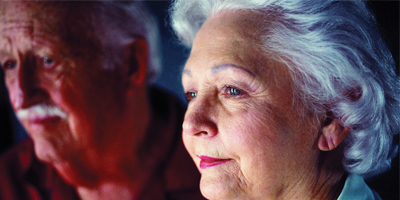End-of-Life Planning
 Discussing end-of-life wishes with your family and care team can often be difficult and emotional. But if you don't have an honest talk about these topics, how will others know and respect your wishes?
Discussing end-of-life wishes with your family and care team can often be difficult and emotional. But if you don't have an honest talk about these topics, how will others know and respect your wishes?
Expressing your wishes
Ideally, it's best to express your end-of-life care wishes now while you are able to make decisions for yourself. Addressing your wishes with family members, your care team or a legal professional will ensure that your expressed requests will be followed when appropriate.
Legal documents, called advance directives, enable you to document your preferences regarding treatment and care at the end of life, in addition to options for comfort care and funeral planning. Your family won't have to guess what you want if you sign advance directives. These documents include a living will and a health care power of attorney.
The information on this page can help you understand the types of care available to you during the late stage of Alzheimer's disease. What you learn may help you make informed decisions about your wishes now and in keeping with your personal values and beliefs.
Questions to consider:
- In what type of environment do I want to spend the end of my life? At home, in a nursing facility?
- What are my religious, spiritual or cultural beliefs about end of life? How can these be respected and honored?
- Do I want all available treatment measures to be taken? Are there any treatments I do not want?
Life-sustaining treatments
Medical care for late-stage Alzheimer's disease may include the use, withdrawal, limitation or refusal of treatment. Your advance directives should include your wishes for any life-sustaining treatment you desire.
Aggressive medical care that will sustain life may include:
- Respirators
- Feeding tubes
- IV Hydration
- Antibiotics
- Cardio Pulmonary Resuscitation (CPR)
- Surgery
Do not resuscitate (DNR)
You may request your physician to sign a "do not resuscitate" (DNR) form, which is a legal order to prevent any attempts at revival, particularly if CPR or defibrillation is needed. If you do not want to undergo CPR or advanced cardiac life support, you must speak with your physician as he/she will need to write a legal medical order that will allow you to complete the DNR form. Without it, medical professionals are required to perform resuscitation on you.
A DNR does not affect any treatment other than that which would require intubation or CPR. Patients who are DNR can continue to get chemotherapy, antibiotics, dialysis or any other appropriate treatments.
Some states do not recognize DNR orders that were initiated out of state, so check with an elder law attorney or the hospital where you plan on traveling.
Hospice care
Your end-of-life wishes should include how you would like to experience care in the final stage of Alzheimer's. Hospice services, also known as palliative care, focus on bringing comfort, self-respect and peace to the final stage of your life in an environment of your choosing — at home or in a facility.
Hospice care aims to ensure that symptoms and pain are controlled, and that goals of care are discussed and honored. A hospice care team may include a doctor, nurse, social worker, dietician, clergy and trained volunteers. They work together to address your physical, emotional and spiritual care as well as that of your family.
Hospice care is covered by Medicare and some private insurance; however, a doctor's order is required in order for you to be evaluated for and receive hospice or palliative care. To be eligible for hospice care, you must be in the end stage of a terminal illness with a life expectancy of less than six months. Hospice benefits may be extended if you live beyond this life expectancy.
Learn more: Hospice Care
What is comfort care?
Comfort care focuses on dignity and the quality of your remaining life. It aims to keep you comfortable and pain-free until life ends naturally. Comfort care does not mean withholding all treatments. A person can continue to receive any necessary medications for chronic conditions (diabetes or high blood pressure), as well as those that prevent pain and discomfort. Comfort care eliminates medical treatments, tests and procedures that may do more harm than good.
Talking with your doctor about end-of-life care
Once you have expressed your end-of-life wishes with your spouse or care partner, it's important to discuss your wishes with your doctor. This will help to ensure that he/she understands your preferences in advance and can be an active participant in ensuring your wishes are met.
Tips for talking with your doctor about your end-of-life care:
- Let your doctor know that you are completing advance directives, and make sure to provide copies for your medical records.
- Make sure you doctor understands how you define "quality of life" vs. "quantity of life."
- Ask your doctor how he/she plans to manage your pain as the disease progresses.
- Ask your doctor about his/her thoughts about hospice care and if he/she is open to ordering this type of care when appropriate.
- Ask your doctor his/her comfort level in carrying out your wishes for end-of-life care.
Brain autopsy and brain donation
You may decide to have a brain autopsy or make a brain donation after death. Both may provide family or researchers a better understanding of Alzheimer's.
- A brain autopsy involves a researcher or physician conducting an examination after death to look for more definitive information about a disease or cause of a person's memory or behavior changes. For example, autopsy can determine if plaques and tangles are present in brains affected by Alzheimer's.
- A brain autopsy may involve cost and special arrangements. Some brain donation programs provide a free autopsy report. It is usually necessary to make arrangements for a brain autopsy before the person dies.
The examination of brain tissue can contribute to research about Alzheimer's disease and other dementias, including research into new treatments.
When donating a brain to research:
- Arrangements must be made with a research center, tissue or brain bank, or university well in advance of the person's death.
- Many organizations are not set up to accept a brain donation without prior arrangement; there may be eligibility requirements and consent forms to sign.
- Research centers often only accept brain tissue from individuals who have participated in a research study.
- If the person with Alzheimer's did not make his/her wishes known for brain donation, the next of kin or legal guardian makes the decision.
- Your local Alzheimer's Association may have a directory of the brain banks and research centers nearest you.
Some brain donation programs provide a free autopsy report. To learn more or find a program near you:
- Alzheimer's Disease Research Centers
- Brain banks: locate one near you
- Contact the Pathology department at your local hospital
Learn more: Brain Donation
Funeral and burial plans
For some, making funeral and burial plans ahead of time is an empowering process. Advanced planning on your part may reduce the stress and uncertainty of these arrangements for your family during a difficult time.
To help make decisions about funeral and burial plans, ask yourself:
- Do I prefer burial versus cremation?
- Is there a family burial location or meaningful place that I would like to identify as my final resting place?
- What type of funeral or memorial service would I prefer? You may have a vision of the details of this memorial including location, flowers and music.
- Do I have a pre-paid burial plan? You may be concerned about family or heirs absorbing the cost for your final arrangements. Pre-paid burial plans or arrangements may be a consideration.

Connect with others in our online community.
Join ALZConnected
Call our 24/7 Helpline anytime: 800.272.3900.
Learn More
